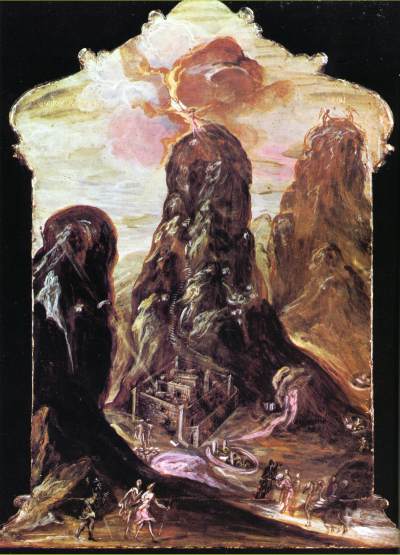|
Although Philo's scheme (Father-God-Lord) does not match New Testament theology
(Father=God, Son=Lord, Spirit), it does show that first-century Bible-readers were willing to entertain the thought
that 'God' and 'Lord,' the two pre-eminent divine titles of the Old Testament,
differed somewhat in meaning. Here is how that principle was applied
by Christian Bible students:
"There is one body and one
Spirit, just as you were called in one hope of your
calling; one Lord, one faith, one baptism; one God
and Father of all, who is above all, and through
all, and in you all." (Ephesians 4:4-6).
"For even if there are so-called gods, whether in heaven or on earth (as
there are many gods and many lords), yet for us
there is one God, the Father, of whom are all
things, and we for Him; and one Lord Jesus Christ,
through whom are all things, and through whom we
live." (1 Corinthians 8:5-6).
 |
` |
|
On most occasions the New Testament uses 'Lord' of Jesus Christ, the Son. In some cases, however, it is specifically
the Father who is addressed as 'Lord': "In that hour Jesus rejoiced in the Spirit and said, 'I thank You, Father, Lord
of heaven and earth, that You have hidden these things from the wise and prudent and revealed them to babes. Even so, Father,
for so it seemed good in Your sight. All things have been delivered to Me by My Father, and no one knows who the Son is
except the Father, and who the Father is except the Son, and the one to whom the Son wills to reveal Him.'"
(Luke 10:21-22). A classic proof that the LORD of the Old Testament is Father, Son
and Holy Spirit comes from Isaiah 6:1-3, combined with John 12:41-42 and Acts 28:25-27, Isaiah's
Temple Vision.
 |
` |
|
Study of Isaiah's temple vision serves as a good corrective for the tendency many people have
to assume, perfectly unself-consciously, that the God of the Old
Testament is the 'Father-only.' This tendency crops up within the
church as well as outside of it: "'I believe in God the Father
Almighty, maker of heaven and earth.' Here the wise worshipper will
celebrate the God of Abraham, Isaac, and Jacob, knowing that this
confession of him as 'father' resonates back to the Jewish
scriptures and that the delight in him as maker of all, heaven and
earth, puts us on a level not only with the author of Genesis 1, but
also with such majestic writings as Psalm 19. . .and Isaiah 40. This
is, in particular, the Israelite and Jewish confession of faith. .
." (N. T. Wright, How God Became King, p. 264). When we march
on to the next clause of the Apostle's Creed, do we discover that
the Son also is the God of Abraham, Isaac, and Jacob? Um, no; we
discover only that He was the prophesied Messiah. But Jesus implied
he was acquainted with Abraham. Why does John think that Isaiah saw
Jesus in the temple, when Isaiah plainly saw the God of Israel? This
author is eager to correct everyone else's misconceptions, and
sometimes he does; but he introduces his own for good measure, lest we
be left without any. The God of the Old Testament is the same as the God of the New
Testament; He does not change. He is triune. The God of neither
Testament is unipersonal.

God the Father
As proof-text for 'Father-onlyism', the Jehovah's Witnesses and 'Oneness'
Pentecostals offer the New Testament idiom of using 'God', 'theos',
with especial frequency of God the Father. For example: "...yet
for us there is one God, the Father, of whom are all things, and we
for Him; and one Lord Jesus Christ, through whom are all things, and through
whom we live." (1 Corinthians 8:6). But it is not evident that this
passage intends to rob Deity from Jesus Christ, given that the Old Testament
titles of God, 'Lord' and 'God', are here split up and apportioned respectively
to Son and Father. The Nicene Creed uses this passage as its template
If it were true that addressing one person of the Trinity
specifically as 'God' in the presence of the others assigns Deity exclusively to Him so named, then 2
Corinthians 13:14 becomes a typical proof-text for 'Father-onlyism': "The grace of the Lord Jesus
Christ, and the love of God, and the communion of the Holy Spirit be with you all. Amen." But
on the same principle, does Hebrews 1:8, where the Father addresses the Son as God, then become
proof-text for 'Son-onlyism'?: "But to the Son He says: 'Your throne, O God, is forever and ever; A
scepter of righteousness is the scepter of Your kingdom.'"? Or Acts 5:3-4 a proof-text for
'Holy Spirit-onlyism'?: "But Peter said, 'Ananias, why has Satan filled your heart to lie to the Holy
Spirit and keep back part of the price of the land for yourself?...You have not lied to men but to
God.'"? Because each of the Three is expressly named as 'God' in the Bible, it cannot be
the intent of this Biblical idiom to shuffle Deity around like the pea in a shell-game, now one
grabbing it away from the other. Perhaps it was exactly to prevent people from thinking there
were three 'Lords' that the title 'Lord,' while most commonly belonging to the Son, is not His
alone, and to prevent them from thinking there are three 'Gods' that Son and Holy Spirit also share
this title.
"Let those, then, who love soberness, and are contented
with the measure of faith, briefly receive what is useful to be known. It is as follows:--When we
profess to believe in one God, by the name God is understood the one simple essence, comprehending
three persons or hypostases; and, accordingly, whenever the name of God is used indefinitely, the
Son and Spirit, not less than the Father, is meant. But when the Son is joined with the Father,
relation comes into view, and so we distinguish between the Persons. But as the Personal
subsistences carry an order with them, the principle and origin being in the Father, whenever
mention is made of the Father and Son, or of the Father and Spirit together, the name of God is
specially given to the Father. In this way the unity of essence is retained, and respect is
had to the order, which, however derogates in no respect from the divinity of the Son and Spirit."
(John Calvin, Institutes of the Christian Religion, Book I, Chapter XIII, 20.)

Witnesses
Unitarians like the 'Oneness' Pentecostals advance the thesis that
the God of the Old Testament is the 'Father-only', versus the orthodox
'Father, Son and Holy Spirit'. According to this way of thinking,
'the Son' and 'the Holy Spirit' are new-comers who first show up in
the New Testament, not having previously been encountered. They take it for granted that everybody
agrees with them on this. And indeed those acquainted with these groups
are familiar with lists of quotations from various Reformation and
early church figures. But where can we find a witness for the
idea that Jehovah, the God of the Old Testament, is the 'Father-only'?
John Calvin? This rather grim figure, a gray eminence looming
over anxious Geneva, is in vogue nowadays, oddly enough: "For even though the majesty of King and Judge
is extended to the whole person of the Mediator, yet unless he had been God
manifested in the flesh he could not have been raised to such a height...And Paul
best settles this controversy, teaching that he was equal to God before he humbled
himself under the form of a servant [Phil. 2:6-7]. Indeed, how would this
equality stand had he not been the God whose name is Jah and Jehovah, who rides
above the cherubim, who is King of the whole earth, and King of the ages?
Now no matter how they grumble they cannot take away from Christ what Isaiah
says elsewhere: 'He, he is our God; we have waited for him'."
(John Calvin, Institutes of the Christian Religion, Book I, Chapter XIII, Section 24); "...we
shall truly say: the God who of old appeared to the patriarchs was no other
than Christ." (John Calvin, Institutes, Book I, Chapter XIII, Section 27).
Hmmm...no.
Martin Luther?: "Did we in our strength confide Our
striving would be losing, Were not the right Man on our side, The Man of God's
own choosing. Dost ask who that may be? Christ Jesus, it is He - Lord Sabaoth His
name, From age to age the same - And He must win the battle."
(A Mighty Fortress
is Our God, Martin Luther). Hmmm...no.
Justin Martyr?: "The Jews, accordingly, being throughout
of opinion that it was the Father of the universe who spake to Moses, though He who
spake to him was indeed the Son of God, who is called both Angel and Apostle, are
justly charged, both by the Spirit of prophecy and by Christ Himself, with
knowing neither the Father nor the Son. For they who affirm that the Son is
the Father, are proved neither to have become acquainted with the Father, nor to
know that the Father of the universe has a Son; who also, being the first-begotten
Word of God, is even God. And of old He appeared in the shape of fire and in the
likeness of an angel to Moses and to the other prophets; but now in the times of
your reign, having, as we before said, become Man by a virgin, according to the
counsel of the Father, for the salvation of those who believe on Him, He endured
both to be set at nought and to suffer..." (The First Apology of Justin, Chapter
LXIII, 7-8). Hmmm...no.
|
